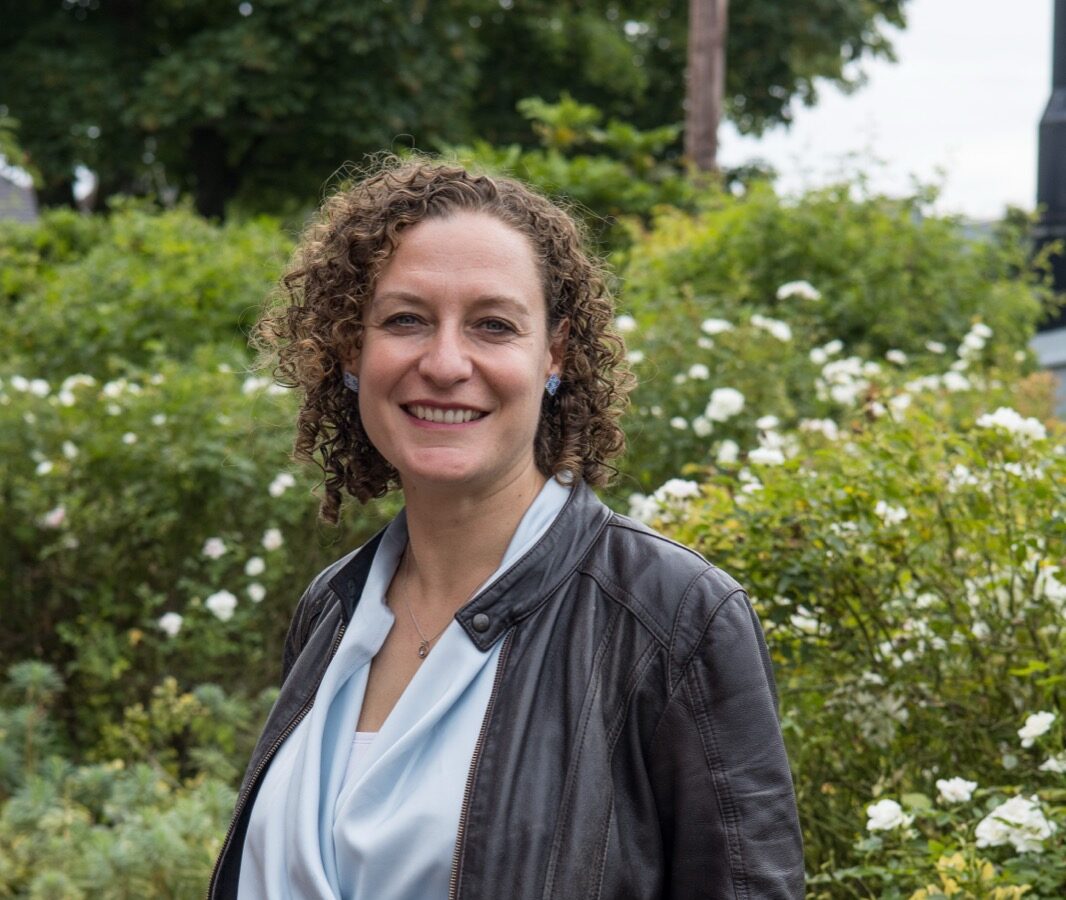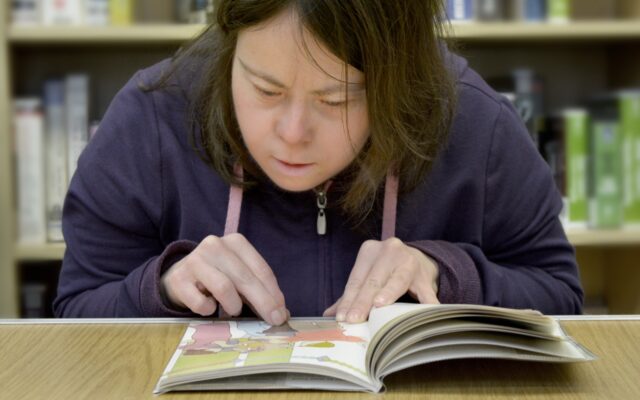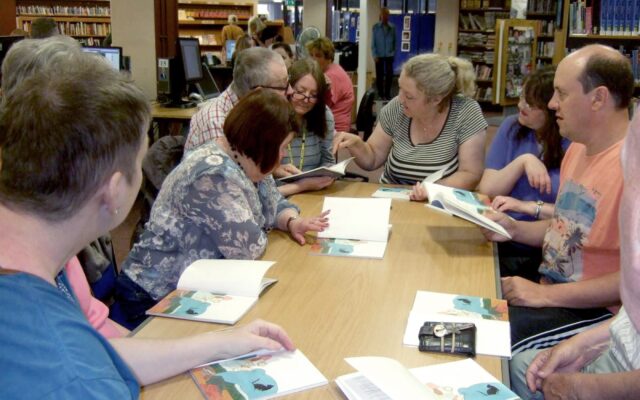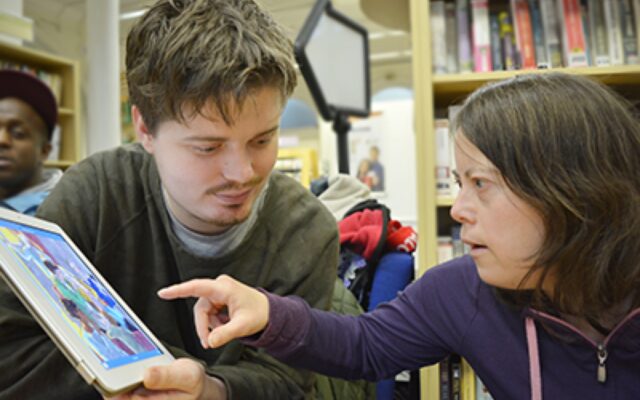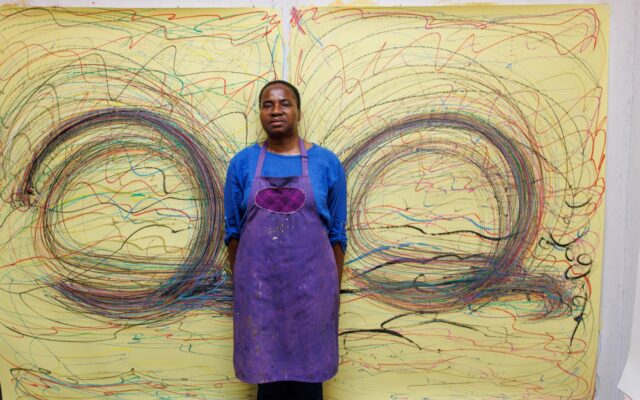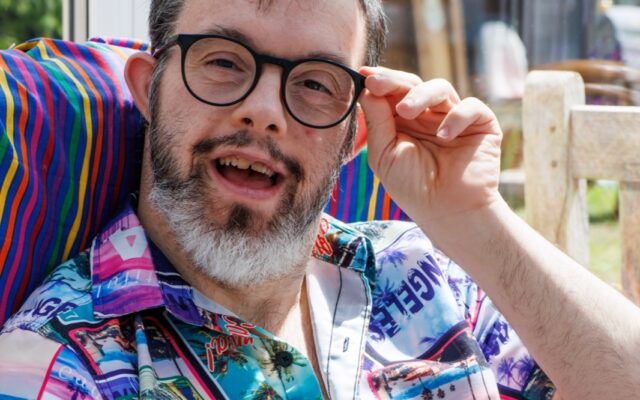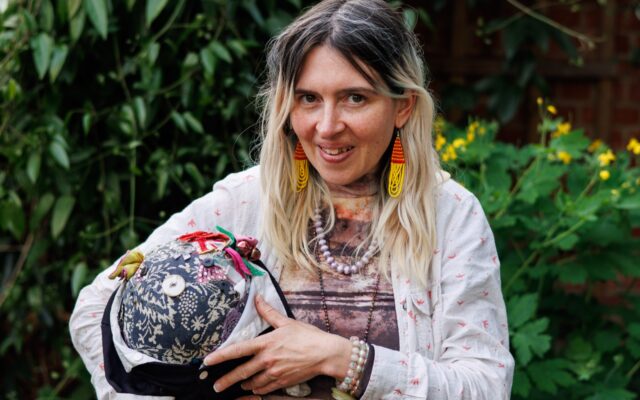“I am dyslexic. I think in pictures. I see patterns. I can’t always think of the right words to use. So I understood the premise behind the fact that you can tell a story with pictures.”
Katie Smith is explaining what drew her to the job as chief executive of Beyond Words, the charity that publishes wordless picture books to enable people with learning disabilities and others to understand and communicate their feelings and discuss their experiences.
Smith, who marked her first year in the role in September, describes another reason why the concept of wordless books resonates: “My late husband had been in an accident which left him completely paralysed and with a brain injury.
“I was very keen that he should be empowered to do what he could do. He could still make decisions for himself if the information was presented to him in the right way.”
She adds: “When I saw Beyond Words and those books, I could just see that they would empower people to make their own decisions and talk about what they wanted to talk about. And it wasn’t just for people with a learning disability. I could see how valuable it would be for so many people.”
Smith has a wide range of experience within and outside the voluntary sector. Her first job was as an assistant at a multimedia training company, before she became an ITV assistant producer. She then moved into the voluntary sector with roles including national project manager at the Multiple Sclerosis Society and operations and fundraising manager at the International League of Dermatological Societies.
She points out that all her jobs shared a focus on “training, picture-focused teaching and sharing information in different ways”.
She closed the book and ran off to get her support worker saying, ‘I read a book, I read a book!’
Over the past 35 years, Beyond Words has published 82 titles covering health, relationships and community life, including Going to Court, Having a Baby as well as Feeling Sad. Some early books were about bereavement – still the most in demand. The latest book, Getting Help With Gas, can be downloaded for free.
The books are co-produced with people with learning disabilities. The process begins with an initial storyboarding stage involving one or more people with lived experience of the issue.
Initial illustrations then go out to a group of about 50 people with learning disabilities for comment. After revisions, the book goes to another 50 people with learning disabilities for further feedback. The process takes about 18 months.
“We could make the books a lot more quickly if I sketched out a storyboard and then an artist drew it but it’s not going to work for the readers,” Smith says. “The books are used in so many different ways that it’s got to work for so many different people.”
Smith works closely with Baroness Sheila Hollins, who founded and now chairs the charity.
Smith says: “Beyond Words wouldn’t exist and certainly wouldn’t keep going without Sheila and the connections and introductions she brings. Because she is a founder for family reasons [Hollins’ son Nigel has a learning disability], she doesn’t lose touch with what it is about.
“She is very passionate and very supportive. She is proud to see the books produced but she can also see how Nigel has really developed in his public speaking skills at the launches and his confidence leading on training. It’s lovely.”
Smith tells me about a young woman who found the books on a Beyond Words stall at a conference about relationships.
She said: “I have not read a book. I can’t read.” So Smith said “Well, let’s give this one a go,” and, together, quite quickly, they read through a book about a new relationship.
The young woman rightly identified issues of consent in the story. She closed the book and ran off to get her support worker saying, “I read a book, I read a book!” Smith says: “That was so powerful. It was for her to tell her story and read her book and understand it.”
Getting personal
Each reader develops their own version of the story. Smith describes a group reading a Beyond Words book about going into hospital.
“They went off on a huge long conversation about managing medication. But what a valuable conversation that was. About understanding that medication should have your name on it, and how many to take, and what the consequences might be if you take the wrong amount. Really powerful. All from one picture.”
There is a demand for new titles but Smith says this depends on funding, which comes largely from charitable trusts.
“Most weeks, I get an email from someone saying, ‘Have you considered doing a book on this or that?’ We get asked all the time for a menopause book and we can see how powerful that would be and there’s nothing out there.
“But we keep getting rejections because it is not something people want to fund. That is challenging because you know how important something like that could be. It’s not a ‘nice to have’ – it is essential.”
Future titles will include Being Safe Online. The books now better reflect diversity, for example, in terms of ethnicity, gender identity and same-sex relationships. This will continue and Smith says she would love to get funding to revise the illustrations in some of the older books.
The main strategic aim is to get the books used in the community – in healthcare and schools.
Beyond Words recently ran its Open Book project which set up a platform to record and evaluate the impact of using the books in schools. That work has now finished and a shareable toolkit based on the project is being produced. A recent report by independent educational assessors has shown the project has had positive effects on pupils’ emotional wellbeing.
Beyond Words recently won National Lottery funding for its Book Club in a Box project, set up earlier this year. It is the charity’s first nationwide initiative and it aims to start 300 book clubs over three years.
They had a huge long conversation about managing medication. What a valuable conversation that was. Really powerful. All from one picture
Beyond Words provides free boxes of 15 books, along with membership cards, posters, a guide on running a book club and evaluation materials. There is a newsletter and online networking with advice. Boxes have been distributed to libraries for new clubs as well as to existing groups at community and day centres.
Smith says Beyond Words “is still finding its personality and settling down. My ambition is to see it really mature as a charity.”
As Smith and I leave the cafe where we have been talking, we pass a man helping his young daughter navigate an escalator.
“No,” he says, “You have to hold my hand. Look!” He points at a sign with a picture of a child holding an adult’s hand. Smith smiles at me: “There you are – it’s all about pictures. Not words.”


